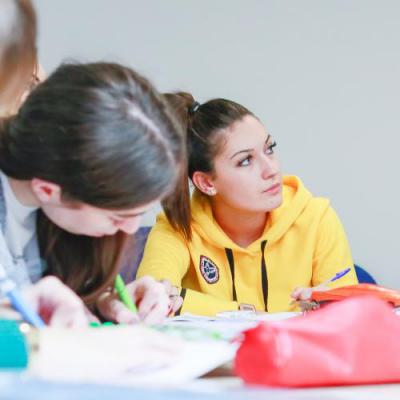Language teaching is one of the main assets of Ichec. Indeed, being located at the heart Belgium and Europe, the future manager is expected to master several foreign languages.
The languages taught at ICHEC are: English, Dutch, German, Italian, Spanish and Chinese.
| English | Dutch | German 2nd language | 3rd language | |
|---|---|---|---|---|
| Bloc 1 | 75* | 75* | 75** | |
| Bloc 2 | 60 | 60 | 60 | 60 |
| Bloc 3 | 60 | 60 | 60 | 60 |
| Bloc 3 gateway | 60 | 60 | 90 | 90*** |
* This course includes an interactive course, a self-learning programme and a remedial course .
** Only accessible if you fulfill criteria to be exempted from the Dutch course.
*** This course goes through basic elements of the language and is only open to gateway students.
Modern teaching methods are used in small interactive classes (more or less 20-25 students). Moreover, our language teachers offer students various additional services.

- Continuous assessment (all year long through various tests)
- Remedial classes (to help students)
- E-learning self-study methods using Internet websites
- Summer prep classes (in Dutch and English)
- Conversation tables
- Cultural trips abroad (Berlin …)
- Research and development of teaching methods
Cours par année d'études
English + Dutch (or German for beginners) – 90 hours/language – 6 credits/class
The main objective of the language classes in Bloc 1 is to help students reach a B1+ level (A2- for German)
The classes (based on everyday language) consist in interactive classes (60 hours – classes taught in small groups, with the emphasis on speaking), and ex-cathedra classes (30 hours – grammar revision, various tests, listening comprehension exercises, vocabulary, remedial classes). Using the language as a communication tool is the main objective of the classes. However, the 1st year programme also insists on revising the language basics (basic vocabulary, grammar…) in order to enable everyone to catch up and strengthen the skills acquired at secondary school. The classes also include e-learning techniques and methods which enable students to learn at their own pace. “Conversation tables” are also organised in Dutch to train speaking skills.
Students exempted from the Dutch class can attend a German class for beginners (90 hours ).
English + Dutch (or German - Pre-intermediate level) – 60 hours/language – 4 credits/class
Interactive classes in small groups. Level required at the end of the school year: B2+ (B1- for German). The main objective of the Bloc 2 language classes is to improve the skills gained in Bloc 1 by tackling the economic vocabulary most commonly used in the corporate and business world. Speaking is the top priority and the exercises focus on economic issues.
3rd language (to be chosen amongst: Chinese, German, Italian, Japanese, Spanish) – 60 hours – 4 credits
Interactive classes in small groups. Each student is to choose a third language. The idea is to emphasize international mobility and open-mindedness. Given that students have already acquired learning strategies in other languages, they progress quickly.
English + Dutch (or German Intermediate level) – 60 hours/language – 4 credits/class
Interactive classes in small groups. Level required at the end of the school year: C1+ (B2- for the German classes – intermediate level). The main objective of the classes is to master the language commonly used in the corporate and business world as well as to develop professional skills that students will use in their life as future managers: chairing meetings, making professional presentations in front of an audience, negotiating, job-interviews (professional-behaviour seminar), expressing a well-developed and informed opinion… Moreover, these classes enable students to take international language tests (IELTS, TOEFL, BEC Higher, Cambridge Certificate in Advanced English…). These certificates enable students to study abroad and are an asset on the students’ CVs. Students are also given the opportunity to improve their language skills thanks to ERASMUS exchanges.
3rd language ( Chinese, German, Italian, Japanese or Spanish) – 60 hours – 4 credits
Interactive classes in small groups – emphasis on the professional sector – training for ERASMUS exchanges.
Students who already have a bachelor's degree attend the 3rd-year classes with everyone else. In order to enable them to meet the objectives of the language classes (and to catch up if needed), level tests (formative assessment) are organised at the beginning of the year. Gateway students who fail these tests are to attend a remedial class (60 hours/language). As far as the 3rd language is concerned, they attend classes in a beginners’ group that will start “from scratch” (90 hours). The objective of these beginners’ classes is to reach the same level as everyone else at the end of the year. However, students who show (by taking the level tests) that they master the basics of the language attend the normal programme (60h).